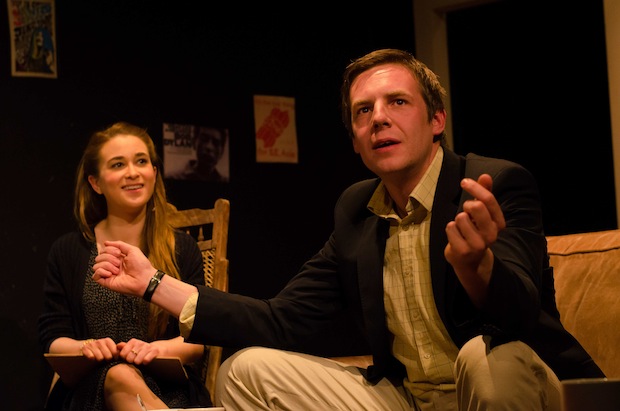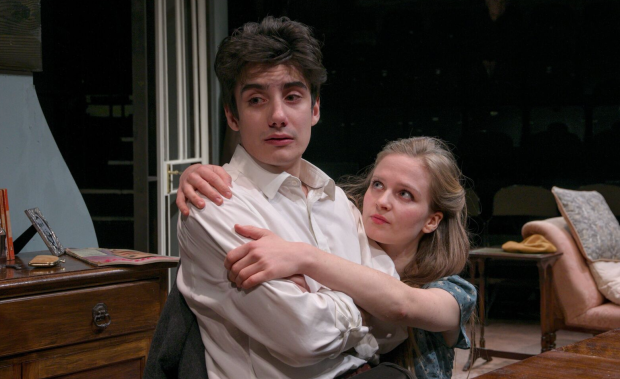Why, oh why, the producers ask, are the national press so reluctant to cover the London fringe? The snag is that a national paper has to justify a report about a play produced in a Deptford yoga studio, or in a Wandsworth priest hole, to readers living in Liskeard, Inverness, Great Yarmouth and Carlisle. Rather than changing the habits of the newspapers, the producers might change the way they select plays. A few years ago, a modest little venue in Hoxton mounted a satire called The Death of Margaret Thatcher. The national papers dispatched their finest critics and they were joined by political commentators from around the world. The play was rubbish, alas, but as a piece of publicity it remains unsurpassed.
Theatre 503 in Battersea seeks to emulate this ploy. A World Elsewhere, by Alan Franks, is set in Oxford in 1968. ‘A girl is losing her heart to a brilliant young American with a dark secret,’ says the blurb. It goes on, almost panting with excitement, ‘Alan Franks was a contemporary of Bill Clinton.’ What a corker! Clinton as a playboy undergraduate, seducing the daughters of the nobility, smoking dope without inhaling, worming his way into leftie groups in order to pass secrets about Oxford’s commies to the CIA (at least according to Christopher Hitchens’s memoir).
Alan Franks’s script doesn’t quite deliver on this promise. The brilliant American, Elliott Farmer, is a conspicuously charmless high-flier who has a colossal talent for soundbites made of pure lard. He tells us he plans to ‘travel east’ when he graduates. After that, he says, he will travel west: because a man can die without getting to know his own people. This isn’t Bill Clinton. It’s bloody Al Gore.
The play is more successful in its attempts to capture the febrile romantic uncertainties of student life. And it features two great cameo performances. Dan Van Garrett is marvellously dour as a plain-speaking northern chemist who offers this refinement on the central tenet of Marxism: ‘All property is theft, so long as it isn’t nicked, like?’ And Crispian Cartwright is wonderfully camp as a lisping and embittered English tutor who steals all his best work from dead students. The Clinton play, however, remains to be written. Biro out, please, Mr Franks, and start again.
Sticking with the 1960s, there’s an adaptation of Fear and Loathing in Las Vegas by Hunter S. Thompson at Waterloo Tunnels. We plunge straight into an acid-crazed nightmare as the screaming dopeheads race across America in a hired convertible. Raoul Duke and his sidekick Dr Gonzo are on a mission to discover the American dream and to purge the world of all that is ‘old and evil’. They’ve got drugs. They’ve got booze. They’ve got self-regard dripping from every pore. What they don’t have is charm. These angry, shouty hipsters are like a pair of tsarist aristocrats ravishing the peasantry in pre-revolutionary Russia. They regard women as either skivvies — ‘Prepare our rooms immediately, we’ll be in the bar!’ — or as potential rape victims. Dr Gonzo picks up a teenage girl by slipping her a tab of acid and seducing her in his hotel suite. Not an uplifting episode.
As a buddy movie the show fails because the drugs kill every sentiment. Both characters are so brain-damaged that they’re incapable of registering any emotion other than the need to swallow more chemicals. And I’m not convinced the actors believe in this show. John Chance, the narrator, performs his part with sincerity and feeling. But Ed Hughes, in the lead, delivers his lines in an artificial honking monotone that makes Thompson’s ‘gonzo’ voice sound like a wobble board resounding in an empty sea cave.
If this is a sly attempt to subvert the material, I salute its subtlety and wit. More likely, Hughes couldn’t find a way into the character and his verbal percussion is merely the noise of an actor hammering hopelessly at a locked door. I don’t venture these criticisms as an outsider or an absentee. I was there, in 1968, and I recall it with perfect clarity. I wasn’t on drugs. I was on rusks. And like every other five-year-old in the world, I had more perceptive insight and more imaginative power than any of the hippie noodle-heads with their daisy-chain coronets and their death-cult hedonism. Overlarge claims are made for the significance of Thompson’s road trip to Vegas. Those who maintain that he revolutionised the newspaper trade by placing himself at the centre of the story have evidently missed the entire journalistic output of George Orwell. That’s quite an oversight. Then again, his supporters were always off their boxes. Most of them still are. Frankly, you’d have to be.
Got something to add? Join the discussion and comment below.
Get 10 issues for just $10
Subscribe to The Spectator Australia today for the next 10 magazine issues, plus full online access, for just $10.
You might disagree with half of it, but you’ll enjoy reading all of it. Try your first month for free, then just $2 a week for the remainder of your first year.














Comments
Don't miss out
Join the conversation with other Spectator Australia readers. Subscribe to leave a comment.
SUBSCRIBEAlready a subscriber? Log in